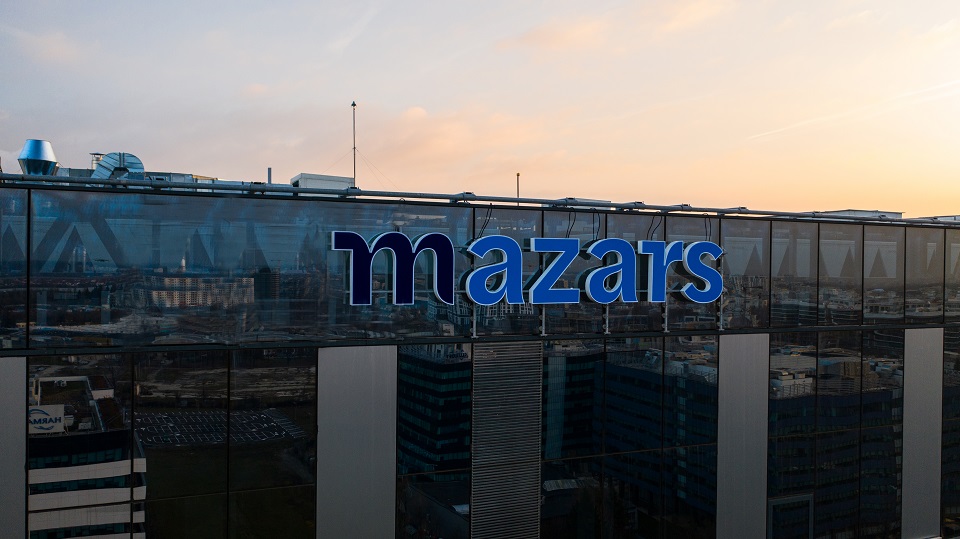Mazars: Dealmaking in CEE held up strongly in 2023 – a testament to the region’s maturity as an attractive M&A destination

- Against a backdrop of falling global M&A activity, dealmaking in Central and Eastern Europe (CEE) held up relatively well.
- The number of transactions in the region in 2023 equals 1,097.
- The total value of M&A activity reaches €37.3bn, according to the reported data and taking into account the criteria set out in the methodology.
- Romania is increasingly catching the eye of investors, solidifying its position as the third most preferred destination in CEE.
- At the local level, the total value of transactions nearly doubled compared to 2022, reaching approximately 4.1 billion euros.
Mazars, the international audit, tax and advisory firm, releases its annual CEE M&A report, prepared in association with Mergermarket. It reveals that dealmaking in the CEE region remained robust in 2023 in the face of global challenges.
The study, Investing in CEE: Inbound M&A report 2023/2024, offers an overview of M&A activity in the region in 2023 and looks ahead to the challenges and opportunities in the coming months.
Overall, the CEE region saw 1,097 transactions, amounting to a combined value of €37.3bn, according to the reported data and taking into account the criteria set out in the methodology. While these figures represent year-on-year declines for the region – volume and disclosed value were each down 15% from 2022 – these falls were less severe than those seen in many other parts of the world.

“Activity was robust in 2023, in fact, volumes and disclosed values in the CEE region are higher than they were in the pre-pandemic period,” said Răzvan Butucaru, Partner, Financial Services & Advisory Leader, Mazars in Romania. “We did well as a region, despite concerns about inflation, pressure on energy prices, and the conflict on Europe’s border. This shows that CEE is a robust market which can face and overcome challenges”, he added.
Widely anticipated distressed M&A activity failed to materialise at scale in 2023. That said, distress is a lagging indicator: more distressed deals are expected as businesses refinance in a tighter borrowing environment.
“We have not yet seen a lot of distressed cases, but we expect more in 2024,” says Günther Mayrleitner, Partner, Mazars in Austria. “There is money in the market from family offices, private equity (PE) firms, and others who are looking for targets, including undervalued companies, distressed companies, and those facing economic challenges. We expect to see increasing business activity in early 2024.”
Telecom took centre stage in 2023 and accounted for two of CEE’s top-10 transactions. The largest of these deals, and by far the biggest in the CEE region, was the €2.5bn acquisition of a 50% stake in the telecom assets of PPF Telecom in Bulgaria, Hungary, Serbia, and Slovakia by Emirates Telecommunications Group, based in the United Arab Emirates.
Private equity activity held up well in 2023, despite brisk headwinds. Total disclosed buyout value rose to €5.4bn, an increase of 33% year-on-year, despite the volume of buyouts falling by 11% over the same period. Simultaneously, the total disclosed exit value in CEE soared by 91% to €5.6bn, the second-highest annual exit total on recent record. Exit volume, though, was also lower, with the 46 deals announced representing a drop of 16% from 2022.
Looking ahead, geopolitical uncertainties seem to bring an element of unpredictability to 2024. Despite this, the macroeconomic outlook is considerably brighter than it was 12 months ago. Inflation is falling sharply in some regions, and particularly among CEE countries. Meanwhile, rate cuts are on the cards. “We expect there will be monetary easing over the next 12 to 18 months,” said Andrija Garofulić, Partner, Mazars in Adria subregion. “I expect valuations to go up, but not as much as two years ago because it was just not realistic. There is now an opportunity to reset the market and start from fairer ground.”
Further key findings from the report include:
- Regional hotspots. Poland, Austria, Romania, and the Czech Republic stand out as the busiest M&A markets in terms of deal volume in the CEE region in 2023. Between them, these four countries generated 709 deals, representing 65% of the total for CEE as a whole.
- Tech is still the star performer. Once again, the technology sector registered the highest number of inbound deals to the CEE region, with a total of 114 transactions. While down year-on-year, 2023 nevertheless stands out as one of the busiest periods for cross-border technology deals on recent records. Technology was also the top sector in terms of cross-border disclosed deal value in 2023, rising sharply by 36% year-on-year to €4.5bn. This makes 2023 the second-most valuable year for inbound deals going back to 2015.
- Could valuations be about to rebound? The median EV/EBITDA multiple for the CEE region across all sectors was 6.7x in the 2022-23 period, according to Mergermarket data. This represents a significant retreat from the 8.1x median multiple seen in 2021-22. The rest of Europe also experienced a decline, although less pronounced than in CEE, with the average multiple falling to 11.4x in 2022-23 versus 12.1x in 2021-22. The former figure is up, however, in 2020-21, when the median EBITDA multiple in the rest of Europe was 11.2x, in CEE, the downward trend has remained consistent (9.2x in 2020-21).
Despite facing significant challenges over the years, Romania’s M&A market has consistently demonstrated its adaptability and resilience in successfully navigating the obstacles encountered.
Romania ranks among the top four M&A markets in the region in terms of deal volume, gaining more and more visibility to international investors as well as developing a strong local investor base.
In 2023, Romania registered an increase in reported deal volume (110 transactions), securing the third position in terms of the number of completed M&A transactions in the region. Furthermore, the total value of these transactions nearly doubled compared to 2022, reaching approximately 4.1 billion euros. The largest deal was the acquisition of Profi Rom Food by Ahold Delhaize, a major player in the global food retail market, from the private equity fund Mid Europa Partners, for €1.3bn.
Răzvan added: “At the beginning of the year, we noticed a slowdown in M&A activity, and in the first two quarters, there was a clear decrease in transaction dynamics. However, starting from the third quarter, we experienced a revival of the market, marked by an increased number of requests for proposals and the start of numerous due diligence processes, representing a significant change from the previous period. This trend translated into a significantly higher volume of transactions in the latter part of the year, and we anticipate that this momentum will continue, generating a significant volume in the first months of 2024. Nonetheless, 2024 will be a year filled with challenges, both locally and regionally, as well as internationally. I am optimistic regarding the positive evolution of the M&A market both in Romania and in CEE, considering the maturity and opportunities it offers.”
When discussing sectors, it’s notable that the technology sector retains its position as the most dynamic, not only within Romania but also across the entire region.

“At the local level, the technology sector is followed by sectors specific to our country, such as pharmaceuticals and medical services, which, although they may not boast high-value transactions, they do demonstrate significant volume. Furthermore, noteworthy sectors include the agri-food sector, real estate, and financial services, all of which have demonstrated a good performance this year.”, mentioned Adrian Mihalcea, Director, Deal Advisory, Mazars in Romania.
In the next period, we need to carefully analyse the factors influencing the M&A market to understand which patterns shape the current activity and in which direction market dynamics are evolving.
Top of Form The full report can be downloaded here.
















